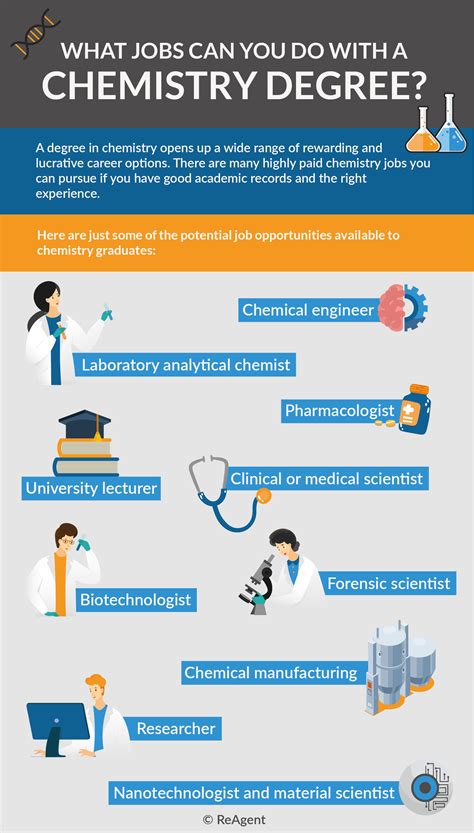Introduction

Chemistry, a foundational science that explores the nature of matter and its transformations, offers a wealth of opportunities for aspiring professionals. With a chemistry degree, graduates are equipped with a versatile skill set that enables them to pursue diverse careers in various industries. This article delves into the promising job prospects and lucrative opportunities available to individuals with a chemistry degree, providing insights into the various career paths, earning potential, and future trends in the field.
Career Paths for Chemistry Graduates
1. Research and Development (R&D)
Chemistry graduates play a pivotal role in research and development (R&D) laboratories, where they design, conduct, and analyze experiments to advance scientific understanding and develop innovative products. They may work in various sectors, including pharmaceuticals, materials science, and energy.
2. Analytical Chemistry
Analytical chemists utilize specialized techniques to identify, quantify, and characterize substances. They find employment in fields such as environmental monitoring, food safety, and forensic science.
3. Chemical Engineering
Chemical engineers apply chemistry principles to design, build, and operate chemical processes. They optimize production efficiency, ensure safety, and minimize environmental impact in various industries, including pharmaceuticals, chemicals, and energy.
4. Medical Chemistry
Medical chemists collaborate with medical professionals to develop new drugs and therapies. They study the interactions between drugs and biological systems to improve patient outcomes.
5. Environmental Chemistry
Environmental chemists study the impact of human activities on the environment. They develop sustainable solutions for pollution control, waste management, and natural resource conservation.
Earning Potential for Chemistry Graduates
According to the U.S. Bureau of Labor Statistics (BLS), chemists earn a median annual salary of $80,550 as of May 2021. The top 10% of earners make over $136,290 per year. Salary expectations vary based on experience, education level, and industry.
Future Trends in Chemistry
1. Green Chemistry
The growing emphasis on sustainability has led to the emergence of green chemistry, which focuses on developing environmentally friendly chemical processes and products.
2. Nanotechnology
Nanotechnology, the manipulation of matter on an atomic and molecular scale, offers promising applications in medicine, energy, and materials science.
3. Computational Chemistry
Computational chemistry utilizes computer simulations to model and predict chemical behavior. This technology accelerates drug design, materials development, and other research endeavors.
4. Biotechnology
The convergence of chemistry and biology has created the field of biotechnology, where scientists engineer living organisms for various applications, including medicine, agriculture, and environmental protection.
Analytical Chemistry: A Case Study
Analytical chemistry involves the identification and quantification of chemical substances. Analytical chemists find employment in various fields, including:
1. Forensic Science
Analytical chemists in forensic science use advanced techniques to analyze evidence and provide expert testimony in criminal investigations.
2. Environmental Monitoring
They monitor air, water, and soil samples to assess pollution levels and ensure environmental compliance.
3. Food Safety
Analytical chemists play a crucial role in ensuring food safety by testing for contaminants, pathogens, and allergens.
4. Pharmaceutical Development
They analyze drug samples to ensure quality and maintain regulatory compliance.
How to Prepare for a Successful Chemistry Degree
1. Strong Foundation in Science
Excel in high school chemistry, physics, and mathematics courses.
2. Research Experience
Gain hands-on experience through internships, research projects, or laboratory assistantships.
3. Communication and Problem-Solving Skills
Develop strong communication skills and the ability to solve complex problems.
4. Specialization
Consider specializing in a particular area of chemistry, such as organic chemistry, analytical chemistry, or biochemistry.
5. Networking
Attend industry events and connect with professionals in the field to expand your network.
Benefits of a Chemistry Degree
1. In-Demand Skills
Chemistry graduates possess highly sought-after skills in various industries.
2. High Earning Potential
Chemist salaries are competitive and often exceed the national average.
3. Job Security
The demand for chemists is expected to grow in the coming years, ensuring job security.
4. Career Advancement Opportunities
Chemistry graduates can pursue advanced degrees (e.g., master’s or doctorate) to qualify for leadership positions.
5. Personal Fulfillment
Chemistry offers the opportunity to make a meaningful contribution to society through scientific research and innovation.
Conclusion
A chemistry degree opens doors to a diverse range of well-paying and rewarding career opportunities. With a strong foundation in science, research experience, and a commitment to excellence, aspiring chemists can navigate the ever-evolving field and make significant contributions to their chosen industry. The future of chemistry holds immense potential for groundbreaking discoveries, sustainable solutions, and advancements that will shape our world. Therefore, pursuing a chemistry degree is an investment in a promising and fulfilling career path.
